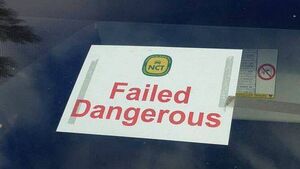Almost half of all cars tested in Co Laois failed the NCT

The National Car Testing Service issued 'Failed Dangerous' stickers on 2,277 vehicles tested in its NCT test centre in Portlaoise last year
JUST over 50% of vehicles that underwent an NCT test in Laois last year passed.
That’s according to figures published by the National Car Testing Service.
The figures for Laois show that from a total of 31,510 vehicles that were tested at the NCT Centre in Lismard Business Park in Portlaoise, 16,482 (52.3%) passed.
The figures also show that 12,751, or 40.5% of vehicles, had a ‘major fail,’ and 2,277, or 7.2%, were issued with ‘failed dangerous’ stickers.
A vehicle categorised as ‘dangerous fail’ is found to have a dangerous defect that constitutes a direct or immediate risk to road safety such that it should not be used on the public road under any circumstances. A sticker stating ‘failed dangerous’ will be affixed to the vehicle by an NCTS vehicle inspector, who will also inform the motorist why and how their car is dangerous and unroadworthy.
According to Applus+ – the Spanish company which operates the NCT on behalf of the Road Safety Authority at 50 test centres in Ireland – NCTS vehicle inspectors will also advise the owners of dangerously defective cars to have them towed away from the centre. The company said customers also read a statement that if they drive the vehicle off the premises, the NCTS will inform An Garda Síochána that a dangerous, defective vehicle was just driven from the centre.
The most common fault detected during checks on more than 1.7 million vehicles nationwide last year related to steering and suspension, which affected 15% of all vehicles, followed by lighting and electrical (14.2%) and the side slip test (12.3%), which checks wheel alignment.
Around one in ten of all vehicles submitted for an NCT in 2024 recorded a problem with their wheels and tyres, with a similar proportion also having some type of fault with their brakes.
Some of the main reasons for a vehicle receiving a ‘fail dangerous’ result include badly corroded bodywork; bald, bulging or damaged tyres; brake fluid leaks; car doors that do not close properly and brake lights not working.
At a county level, the highest share of ‘fail dangerous’ vehicles last year was recorded in Cavan, where 11.9% of cars tested were dangerously defective – a total of 1,831 vehicles – followed by Leitrim (10.3%), Clare (9.7%) and Monaghan (9.4%).
The lowest proportion of vehicles to be classified as ‘fail dangerous’ was found in Offaly (6.1%); Kildare (6.3%); Louth and Waterford (both 6.7%); Dublin and Wicklow (both 6.8%) and Kilkenny (7%).
The latest NCT figures also show that the pass rate for the full test has fallen to its lowest level in five years at 50.6% – down from 52.9% in 2023 and the recent high rate of 54.3% in 2022.
A record number of 1,732,095 vehicles were tested last year – an annual increase of over 144,000 full tests.
Applus+ communications manager Sinéad McKeon said the reaction of motorists with a ‘fail dangerous’ vehicle is mixed, with some ignoring the warnings and driving off in their car from the test centre.
Ms McKeon said the high level of ‘fail dangerous’ vehicles was probably linked to people not servicing their car on a regular basis.
“People don’t check on their car in advance of going in for a test and they are using the NCT as a diagnostic tool instead of getting their vehicle serviced first,” she said.
The NCT was introduced in 2000. It was designed to reduce the number of road deaths by identifying defects in vehicles as well as enhance environmental protection by reducing harmful vehicle emissions.
Private vehicles must undergo an NCT test when they are four years old and every two years thereafter until their tenth anniversary, after which they need to be tested annually.
The Road Safety Authority stresses that the NCT does not replace or remove responsibility from the owners of vehicles to ensure their vehicle is in a roadworthy condition at all times. It also points out that the test should not be used as a substitute for the regular maintenance that needs to be carried out on a vehicle.




